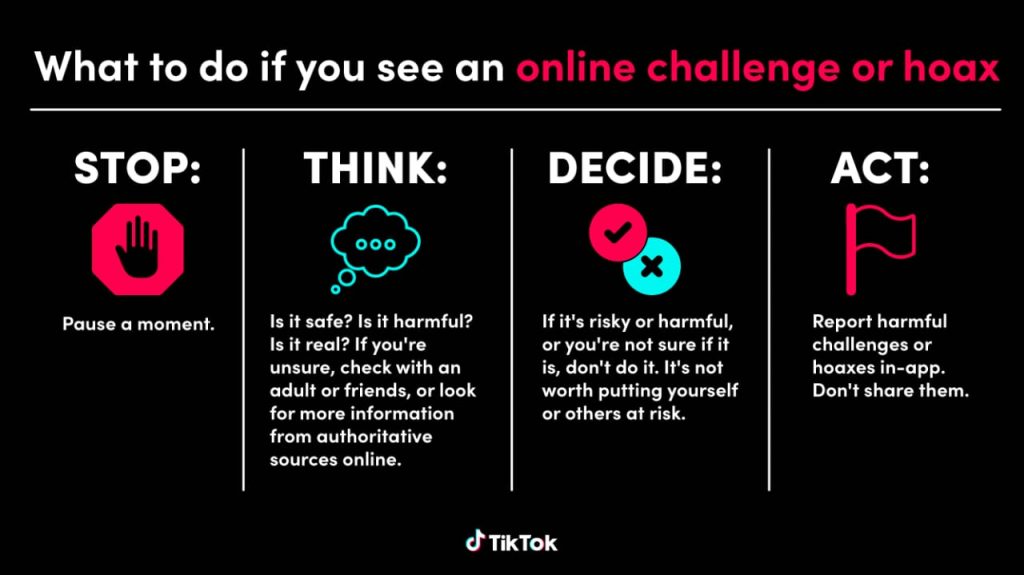TikTok, the world’s leading video platform, is designed to advance joy, connection, and inspiration to millions around the world. Fostering an environment where creative expression thrives requires that the platform also prioritizes safety for the online community, and especially younger community members. In this vein, TikTok shares the interests of parents and caregivers in this mission and is committed to listening and working with external experts to inform its efforts.
Consequently, the video platform has launched a global report to better understand young people’s engagement with potentially harmful challenges and hoaxes. While not unique to any one platform, the effects and concerns are felt by all, which is why TikTok set about to learn how it might develop even more effective responses as it works to better support teens, parents, and educators. It also hopes to contribute to a wider understanding of this area.
Through this first step and the encouragement of discourse on the subject, TikTok aims to use this work with world-leading experts to make a thoughtful contribution to the safety and safeguarding of families online. TikTok will continue to explore and implement additional measures on behalf of the community.
In addition to this, TikTok launched social media awareness campaigns like #AapSafeTohAppSafe to promote safety on the platform and recently also launched its online Safety Center in Urdu which provides resources, guidelines, and policies to educate users on safety, security, and privacy. TikTok has also held public webinars with leading publications in Pakistan to promote safety and continues to make efforts to make the platform a safe place for its users.
The study surveyed more than 10,000 people (including teens, parents, and teachers from Argentina, Australia, Brazil, Germany, Italy, Indonesia, Mexico, UK, US, and Vietnam) and consulted experts from around the world. It commissioned Praesidio Safeguarding, an independent safeguarding agency, to write a report to capture key findings and recommendations.
The report was written by Dr. Zoe Hilton, Director, and Founder of Praesidio Safeguarding. The study convened a panel of 12 leading youth safety experts from around the world to review and provide input into Dr. Hilton’s report. It partnered with Dr. Richard Graham, a clinical child psychiatrist specializing in healthy adolescent development, and Dr. Gretchen Brion-Meisels, a behavioral scientist specializing in risk prevention in adolescence to guide and advise us.
Key learnings about how online challenges and hoaxes are experienced:
Online challenges:
Online challenges or dares typically involve people recording themselves doing something difficult, which they share online to encourage others to repeat. The majority are fun and safe, such as the Ice Bucket Challenge or #BlindingLightsChallenge, but some promote harmful behaviors including the risk of serious injury. When asked to describe a recent online challenge, 48% of teens said recent challenges they had seen were safe, categorizing them as fun or light-hearted, 32% included some risk but were still safe, 14% were described as risky and dangerous, while 3% of online challenges were described as very dangerous. Just 0.3% of teens said they had taken part in a challenge they categorized as really dangerous.
Teens use a range of methods to understand the risks that may be involved in online challenges before they participate, such as watching videos of others taking part in challenges, reading comments, and speaking to friends – 46% said they want “good information on risks more widely” and “information on what is too far.”
Suicide and self-harm hoaxes: Some challenges are hoaxes. A hoax is a lie intentionally planted to trick people into believing something that isn’t true. The purpose of a malicious hoax is to spread fear and panic.
31% of teens have felt a negative impact of internet hoaxes and, of those, 63% said the negative impact was on their mental health.
56% of parents said they wouldn’t mention a hoax unless a teen had mentioned it first, and 37% of parents felt hoaxes are difficult to talk about without prompting interest in them.
What TikTok is doing to build on existing safeguards:
Removing warning videos: The research showed how warnings about self-harm hoaxes – even if shared with the best of intentions – can impact the well-being of teens since they often treat the hoax as real. While TikTok already removes and takes action to limit the spread of hoaxes, to further protect the community the platform will start to remove alarmist warnings. TikTok will continue to allow conversations to take place that seeks to dispel panic and promote accurate information.
Expanding enforcement measures: Having strong policies is an important part of TikTok’s work to protect its community, and it’s essential that these policies are coupled with strong detection and enforcement measures. The platform has created technology that alerts safety teams to sudden increases in violating content linked to hashtags and has now expanded this to also capture potentially dangerous behavior.
Offering new resources to support the community
Building on the Safety Center: TikTok has developed a new resource for the Safety Center dedicated to online challenges and hoaxes. This includes advice for caregivers that aim to address the uncertainty they expressed about discussing this topic with their teens.
Improving warning labels and PSAs: Should community members attempt to search the platform for content related to harmful challenges or hoaxes, a new prompt will encourage community members to visit the TikTok Safety Center to learn more. And should people search for hoaxes linked to suicide or self-harm, TikTok will now display additional resources in search.





 Huawei reaffirms commitment to offering health and fitness solutions with the opening of its largest HUAWEI Health Lab yet
Huawei reaffirms commitment to offering health and fitness solutions with the opening of its largest HUAWEI Health Lab yet